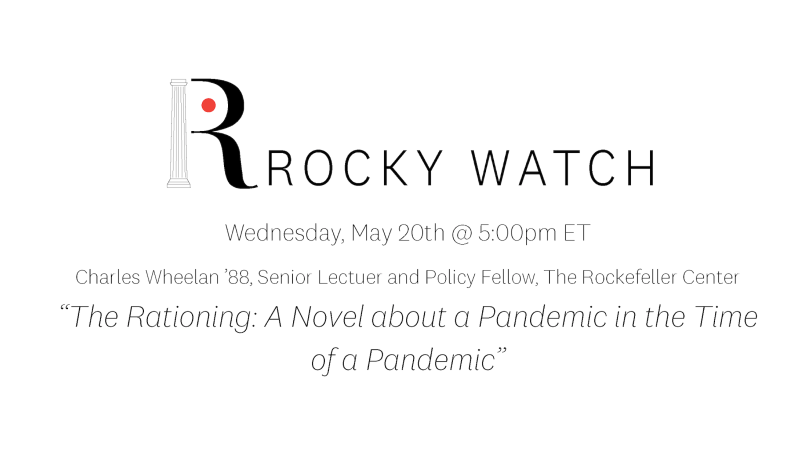
- Public Policy
- Leadership
- Funding
- News & Events
- About the Center
Back to Top Nav
Back to Top Nav
Back to Top Nav
Back to Top Nav
On Wednesday, May 20th, 2020, students and community members tuned in once again to Rocky Watch, the Rockefeller Center’s series of virtual public policy broadcasts. The series welcomed Professor Charles Wheelan, a senior lecturer and policy fellow at the Rockefeller Center. Professor Wheelan’s recent fiction novel, The Rationing, came out just months prior to the arrival of the COVID-19 pandemic. In his lecture, entitled “The Rationing: A Novel about a Pandemic in the Time of a Pandemic,” Professor Wheelan discussed the unsurprising nature of the current pandemic, as well as other long-term public policy issues that we tend to neglect in favor of more pressing problems.
While the theme of a pandemic is certainly eerie given our current crisis, Professor Wheelan argued that this theme was just a coincidence and served as a representation of other “termites in the basement.” In my interview with him, Professor Wheelan equated these “termites in the basement” public policy issues to a leaky roof. While a leaky roof may be problematic in the long run, we often focus on more urgent issues, such as the garage catching on fire. However, it was also noted that “as with a leaky roof and termites in the basement, at some point things just collapse cataclysmically.” Neglecting long-term issues, such as a pandemic or climate change, ultimately leaves us unprepared to deal with the fallout of these events.
The title of the novel, The Rationing, represents what Professor Wheelan noted as the “fundamental tension” of the novel, where “we need something desperately, but we don’t have enough of it.” The impending shortage of the antibiotic, Dormigen, causes significant panic over how to ration the antibiotic to the population. In the novel, government officials wrestle over whether certain segments of the population, such as prisoners and the elderly, should be granted the same chance to receive the vaccine in a lottery system. As we are seeing with COVID-19, rationing tends to come up in every crisis scenario, whether it be respirators, a vaccine, or even toilet paper. While we can’t always anticipate when crises will arise, Professor Wheelan noted that “there is always more that we could be doing.”
Professor Wheelan also discussed his novel and the current pandemic, comparing what turned out to be accurate and what did not. Similar themes among the two pandemics included rationing, the proliferation of fake news, data modeling, political conflict, tension with China, and federalism. As for differences, Professor Wheelan mentioned the benign nature of India in his novel, which is not as true currently, as well as the lack of respect for “faceless bureaucrats,” or unknown service workers. In what Professor Wheelan deemed a “sad irony,” we neglect the importance of these service workers because we fail to see the worth of their work, which is often essential to our daily lives.
Ultimately, Professor Wheelan’s novel highlights the importance of addressing long-term public policy issues. While these issues may not pose an immediate risk to our nation’s security, they will cause significant damage to our society if left unchecked, as we are seeing with the current pandemic.
-Written by Sydney Towle ’22, Rockefeller Center Student Program Assistant for Public Programs
Rocky Talk Podcast w/ Professor Charles Wheelan: Apple Podcasts and Spotify.